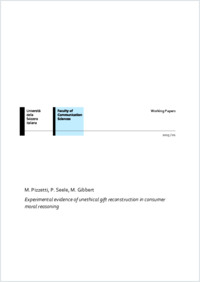Experimental evidence of unethical gift reconstruction in consumer moral reasoning
- Pizzetti, Marta Istituto di Marketing e Comunicazione Aziendale (IMCA), Facoltà di scienze della comunicazione, Università della Svizzera italiana, Svizzera
- Seele, Peter Istituto di Marketing e Comunicazione Aziendale (IMCA), Facoltà di scienze della comunicazione, Università della Svizzera italiana, Svizzera
- Gibbert, Michael Istituto di Marketing e Comunicazione Aziendale (IMCA), Facoltà di scienze della comunicazione, Università della Svizzera italiana, Svizzera
-
2015
45 p.
English
There are empirical evidences that consumers do not walk the talk. Although they express a preference for ethical products, they often consume indifferently. Nonetheless, we know little about the factors that facilitate unethical consumption. This article uses the experimental method to investigate the unethical consumption in the gifting experience context and the impact of psychological distance. An exploratory study shows that consumers are willing to accept morally questionable gifts in order to not hurt the giver. Moreover, two experiments demonstrate that consumers are a. eager to accept an unethical gifted product and b. they cognitively reconstruct it as less unethical. However, the unethical gift cannot be reconciled from an emotional standpoint, resulting in an emotional misalignment. The recipient feels guilty about the decision, especially if the product is sourced locally. Several theoretical and managerial contributions are derived from this study’s findings.
- Language
-
- English
- Classification
- Information, communication and media sciences
- License
-
License undefined
- Open access status
- green
- Identifiers
-
- RERO DOC 234814
- ARK ark:/12658/srd1318748
- Persistent URL
- https://n2t.net/ark:/12658/srd1318748
Statistics
Document views: 195
File downloads:
- Texte intégral: 196
